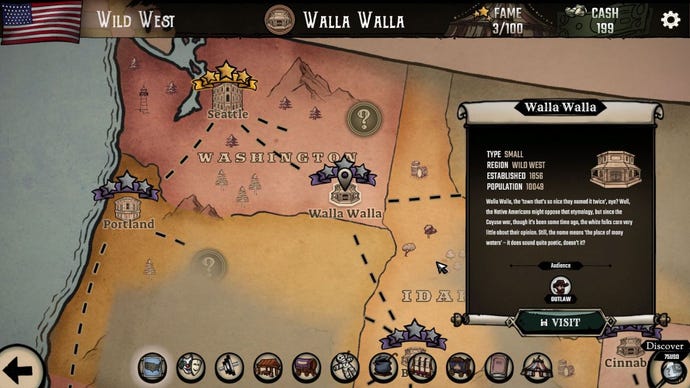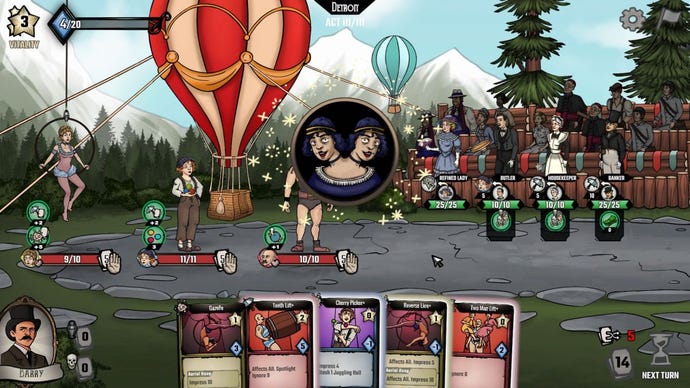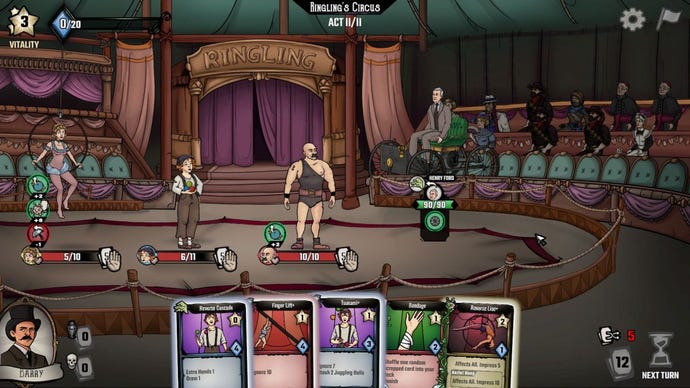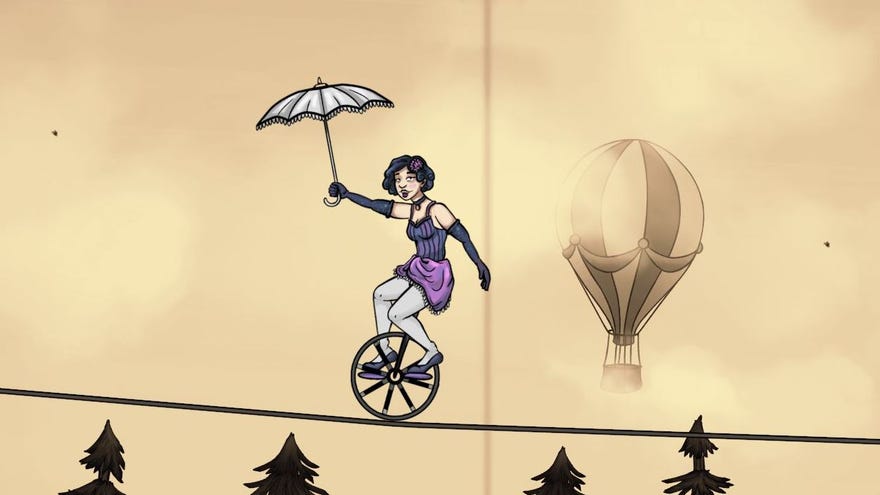The Amazing American Circus review: I hate to say it, but there are better shows in town
Not so big top
By the time Henry Ford rolled up to see my show, I was ready to pack my trunk and say goodbye to the circus. I’d been ready a long time ago, truth be told, some time between inciting industrial action amongst JP Morgan’s workers and nabbing an automaton from Tesla. My troupe spread delight wherever we roamed, but the crowds weren’t to know we’d been plying the same tricks for hour after hour - nor that it had hardly taken one to hone my act to the point where failure was inconceivable. Every meagre juggling trick brought whoops from the crowd and impatience to my heart. With every high-wire act, my spirit sank lower still.
There’s no turn around coming, I’m afraid. The Amazing American Circus is a deckbuilder with some nice ideas, but it’s far more clown than strongman.
It all kicks off with a funeral. Your dad’s dead, and you’ve inherited his decrepit circus just in time to enter a national competition with a snazzy hundred thousand dollar prize. So off you go, touring late 18th century America with your drunken uncle in tow, building up your skills and reputation one show at a time. Each performance looks more or less like a battle from Slay The Spire, except you’re trying to entertain your opposition rather than decapitate them. You’ve got to whittle down your spectator’s boredom bars until they reach delight, and shield your performers from heckles by playing cards that apply “ignore”. There are Darkest Dungeon style buffs and debuffs in play, too, alongside a management layer that sees you figuring out how best to feed, train and look after your artists. I couldn’t have been more on board with all this.
It’s a charming premise, initially sold well. I liked the prospect of playing a card ‘em up where the story had a drive of its own, rather than pieces of the world just prying their way in through occasional multiple choice events. I also liked the idea of making strategic choices that filtered down into tactical ones, like mulling over whether to invest in better recipes in order to more quickly unlock troupe-wide bonuses, or instead use the cash to cure my juggler’s egotism. All of the ingredients for an excellent game are here, with more than enough happening adjacent to the actual card game to have, potentially, made up for it being a little lacklustre - except, argh, it’s not just a little lacklustre. It’s repetitive to the point of being downright dull.

For each show, your deck of cards is determined by which three artists you decide to bring with you. It’s helpful to think in allegories: strongmen are your defensive warriors, jugglers your damage dealers, clowns your tricksters. The counting chickens are wizards whose powers revolve around prime numbers, I guess, though I’ve never actually recruited one. That’s partly because a prime number killed my family and I never want to think about them again, and partly because one of the not so amazing things about The Amazing American Circus is that it gives you very little incentive to swap your performers around.
"One of the not so amazing things about The Amazing American Circus is that it gives you little incentive to swap your performers around."
You can do that. Every town where you pitch your tent boasts new potential recruits, with an entire section of camp dedicated to upgrades that increase the variety and quality of their cards. The problem is that those artists start at level one, which means you’re paying to swap out a tried, tested and gradually improving strategy for one which may completely backfire. I realised later on that the camp upgrades I’d bought meant that new recruits’ starting hands were actually pretty decent, but by that point every show was a wild success anyway. I’d built around certain cards between artists working well together, and didn’t have it in me to blow all of that up for a new set that were still quite likely to be worse.
It doesn’t help that the shows themselves often take an agonizingly long time. Performing in big cities means clicking your way through three separate acts, with a new audience to whittle down each time. I yelled at my screen when the curtain rose for act two of a particularly prolonged encounter, featuring both totem poles that could only take one damage at a time and "Indians" with an “endless discontentment” buff that meant I had to deplete their boredom metres four times over. That makes stereotypical representations of Native Americans a doubly questionable inclusion, especially seen as they’re all presented wielding tomahawks. It’s a casual use of a trope that could have been avoided or subverted.

It’s worth mentioning those fights can go even longer if you’re struggling, too, because failure comes by a thousand cuts. Your artists all have individual health pools (or “focus” pools, if we’re staying on theme), and each time they get depleted you choose one of their cards to sacrifice for that performance. That does introduce some interesting decisions about who to protect and how best to handle a diminishing deck, but those come at the cost of lengthy doom-spirals becoming par for the course if you’re not absolutely smashing it. Watching your effectiveness slowly dribble away just isn’t a good time.
I haven’t even mentioned the bugs, of which there are many. I had moments where spectators would damage me right through my ignore for no discernable reason, a fair few problems trying to wrangle my coach into not picking circuitously long routes, and a couple of occasions where the game simply broke. For me, with the review build, that consistently happens with the first spectator you have to impress for the final performance. He just remains frozen in place once I’ve tried to impress him on the third turn, endlessly contemplating how best to sneer at my efforts. It’s a cruel metaphor for the ultimate disappointment that is The Amazing American Circus, but still an unfortunately appropriate one.

I’m convinced this could have worked. The deckbuilding genre is getting increasingly crowded, but there’s still more than enough room for one with personality and a neat thematic twist. Beyond the bugs, it’s frustrating how much comes down to balancing - if there’d been more pressure on me to mix up my strategy, perhaps simply by making negative quirks harder to remove and incentivising bringing in new recruits, I’d have encountered more of the variety my run sorely needed. Hell, even just an option to speed up the animations would have gone a long way to making drawn-out encounters more palatable.
There’s still a certain compulsion to whacking out cards in an optimal order, figuring out the most impressive combos during performances and the most efficient routes through the meta-game camp upgrades. There are endearingly playful touches, too, like the way my strongman quivers when he’s nervous, or how Henry Ford rocked up to that show in a motorised carriage with a plush leather seat. Those joys fade fast, though, and you’re left with a slog to a finale you’ll just have to hope is no longer broken. I hate to say it, but there are better shows in town.


